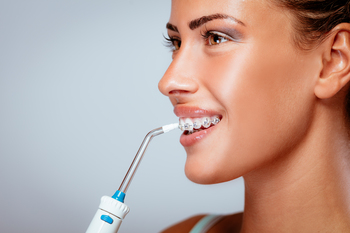Introduction
Oral health is critical to overall well-being, and regular flossing is essential to maintaining good oral health. Traditionally, string floss has been the go-to method for removing food particles and plaque from tight spaces between teeth, which regular brushing might miss. However, water flossers, also known as oral irrigators, have introduced a new dimension to interdental cleaning. These devices use a stream of water to remove plaque and food debris, offering a more effective or convenient alternative to traditional string floss. This article examines whether a water flosser is worth incorporating into one’s daily routine by examining its effectiveness, ease of use, and value compared to traditional flossing methods.
What is a Water Flosser?
Water flossing dates back to the 1960s, when it was first developed to improve oral health. Modern water flossers come with multiple pressure settings, allowing users to adjust the force of the water stream according to their comfort and needs. Some models also feature multiple tips, catering to different dental needs, such as cleaning around braces or dental implants.
Benefits of Using a Water Flosser

Water flossers offer several benefits contributing to good oral health, making them an attractive option for many people. One of the primary advantages is their effectiveness in plaque removal and prevention of gum disease. Studies have shown that water flossing can be significantly more effective than traditional string floss in reducing gingivitis, gum bleeding, and plaque accumulation.
Water flossers are particularly beneficial for individuals with braces, dental implants, or other types of dental work. The stream of water can easily navigate around these structures, providing a deep clean that is often challenging with standard dental floss. This feature is crucial in preventing periodontal diseases and maintaining the longevity of dental work.
Additionally, water flossers are user-friendly, especially for those who struggle with the manual dexterity required for traditional flossing. They are also a great solution for people with sensitive gums, as the pressure settings can be adjusted comfortably, reducing discomfort during flossing. The ease of targeting the entire mouth, including hard-to-reach areas, ensures thorough cleaning, contributing to overall gum health and a healthy smile.
Comparing Water Flossers and Traditional Flossing
Several factors come into play when evaluating water flossers against traditional string floss, including effectiveness, user experience, and environmental impact.
Effectiveness:
Numerous studies, including randomised controlled clinical trials, have compared the effectiveness of water flossers to traditional flossing in removing plaque and reducing gum disease.
User Experience:
Traditional string flossing requires manual dexterity and can sometimes be challenging for people with limited mobility, orthodontic appliances, or sensitive gums. In contrast, water flossers are often considered more comfortable and easier to use, especially for reaching the back teeth and cleaning around dental work. Water flossers’ multiple pressure settings and tips enhance user convenience and comfort.
Environmental Impact:
Traditional dental floss, especially disposable floss picks, can contribute to environmental waste. Water flossers, being reusable and requiring minimal consumables, present a more sustainable option in the long term.
However, it’s important to note that some dentists still recommend string floss as an essential part of daily oral care, particularly its ability to scrape off plaque’s sticky biofilm. While water flossers are effective, they might only partially replace the mechanical action of string flossing in certain cases. Therefore, choosing between water flossers and traditional flossing might depend on individual needs, preferences, and specific dental conditions.
Cost Analysis
When considering whether a water flosser is worth the investment, it’s important to examine its initial cost and ongoing maintenance expenses compared to traditional flossing.
Initial Investment: The cost of purchasing a water flosser can vary widely depending on the brand, model, and features. Generally, they are more expensive upfront than buying a pack of standard dental floss or floss picks. However, this initial cost should be weighed against the longevity and features of the device, such as multiple pressure settings and interchangeable tips.
Maintenance Costs: Unlike traditional floss, which is disposable, water flossers require electricity and occasional replacement of parts like tips or filters. However, these costs are relatively minimal and infrequent. Additionally, the durability of water flossers means that the initial investment can be spread over several years, making it cost-effective in the long run.
Comparison with Traditional Flossing Costs: The ongoing expense of buying traditional floss or floss picks can add up over time. While each purchase may seem inexpensive, the cumulative cost can be significant, especially considering the environmental cost of disposable products.
Investing in a water flosser can be worthwhile in terms of dental health benefits. Effective plaque removal and gum disease prevention can reduce the need for professional cleanings or treatments for dental issues, potentially saving money on dental care in the long term.
Potential Drawbacks

Despite the benefits, there are some potential drawbacks when deciding whether a water flosser is the right choice for your oral hygiene routine.
Learning Curve: There can be a learning curve for new users in mastering a water flosser. Adjusting to the right water pressure setting, manoeuvring the tip around the entire mouth, and getting used to the sensation of water flossing can take some time. This might be off-putting for some individuals who prefer the straightforwardness of traditional string floss.
Portability and Storage: Water flossers are generally bulkier than a pack of dental floss, requiring more storage space in the bathroom. For those with limited space or who travel frequently, the size and need for a power source can be inconvenient. Portable models may offer different power or capacity than countertop units.
Water Consumption and Messiness: A water flosser can be messy, especially for beginners. The process involves water splashing, which might require additional cleanup. Also, these devices use more water than traditional floss, which could concern environmentally conscious individuals.
Dependency on Electricity: Most water flossers require an electrical outlet, limiting where they can be used. This dependency might be better for those who prefer a more mobile or low-tech flossing method.
Conclusion

In conclusion, water flossers present a compelling alternative to traditional string floss, offering effective plaque removal, ease of use, and suitability for various dental needs. While they require a higher initial investment, their long-term benefits in dental hygiene and potential cost savings in dental care can justify the expense. However, considerations such as the learning curve, storage requirements, and water usage are important when deciding whether a water flosser is right for your oral care routine. Ultimately, the decision to switch to or incorporate a water flosser should be based on individual needs, preferences, and lifestyle.
Infinity Dental Care is available to assist those seeking further advice on whether a water flosser is suitable for their dental health regimen or for any other dental inquiries. Feel free to visit Infinity Dental Care for personalised oral health guidance, or call (02) 9159 6237 for expert consultation and care.
References:
https://www.verywellhealth.com/is-water-flossing-better-than-string-flossing-4137725
https://www.healthline.com/health/dental-and-oral-health/waterpik-vs-flossing
https://www.webmd.com/oral-health/what-is-waterpik

